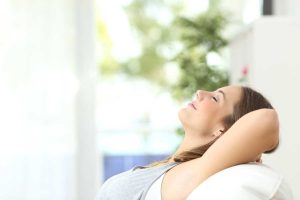
Ms. T is a 27 year-old female from California. She was officially diagnosed with POTS in July of 2013 but reports experiencing a lot of fatigue and fainting for about a decade, which she attributed to an eating disorder she had when she was younger. She feels she possibly had some symptoms during high school, and by the time she was in college she had definite symptoms. Her symptoms became much worse in 2011. Her main POTS symptoms were extreme fatigue, fainting, dizziness, and migraine headaches. She also experienced numbness in her fingers and toes, and on occasion, she could not feel her legs. She was able to prevent the fainting by taking Fludrocortisone, but she still experienced her other symptoms. She reported additional symptoms of depression that she believes were due to her extreme tiredness. She also was diagnosed with mitral valve prolapsed and mild mitral regurgitation. She was a runner, and tried to run a marathon in 2010. She also had been in a master’s program to become a therapist, but had to stop due to symptoms of POTS. Her long term goal was to return to school.
Ms. T had tried increasing salt and water intake, taking medications, breathing exercises, and exercises to strengthen her legs with minimal relief of symptoms. Her doctors told her that she would need to remain on medication for the rest of her life to manage her symptoms. Her biggest concern was that she was also told that she would not be able to have children due to the medications she required. Ms. T came to the POTS Treatment Center in Dallas, Texas in September of 2013. At the POTS Treatment Center, she underwent an intensive two week treatment program. Treatment consisted of sessions 5 days a week averaging 3 hours per session. Training included diaphragmatic breathing, regulation of heart rate, Biofeedback, orthostatic intolerance training, nutrition, supplements, sleep/stress management and other health and behavior interventions. She reported feeling an initial improvement in symptoms on the third day of treatment. By the fifth day, she reported that her fatigue had improved so much that she was able to wake up to her alarm clock, which she had not been able to do for a long time. She felt much more energy, and was able to be more active than usual, going shopping and out to eat with friends. She also noted that she became more aware of times when she felt stress in her chest. She was able to use her relaxation skills she learned to control the stress. By the end of the two week treatment program, she felt her symptoms had decreased overall, and noted a great improvement in fatigue, headaches, and dizziness (see symptom rating chart below). She felt she had experienced a 100% improvement in symptoms by the end of the program.
Ms. T’s levels of anxiety and depression indicated improvement after the two week treatment program as well. Her Beck Anxiety Inventory (BAI) score pre-treatment was 18, indicating moderate levels of anxiety. Upon completion of the two week treatment program, her BAI score was 2, which is a minimal level of anxiety. Her Beck Depression Inventory-II (BDI-II) score pre-treatment was 11, indicating mild to moderate symptoms of depression. Post-treatment, her BDI-II score was 0, which is a normal level of depression.
Ms. T was able to eliminate all medications and became pregnant six months after the completion of her two week treatment program. She reports having a healthy pregnancy and a 100% natural birth. Three years after the program, Ms. T is a successful mother and business-owner. She exercises regularly, participating in competitive-level rowing as well as cycling, running and hot yoga. She does not use any medications or supplements but reports continuing her Home Program training to maintain progress and manage symptoms during periods of increased stress.
|
Symptom |
Pre-Treatment Rating |
Post-Treatment Rating |
3 yrs. Post-Treatment Rating |
|
Nausea |
8 |
0 |
0 |
|
Headaches |
2 |
0 |
0 |
|
Dizziness |
10 |
0 |
0 |
|
Tachycardia |
10 |
0 |
0 |
|
Fatigue |
10 |
0 |
1 |
|
Sleep (#hours) |
9 |
8 |
8 |
|
Anxiety |
7 |
0 |
0 |
|
Chest Tightness |
5 |
0 |
0 |
|
Abdominal Pain |
5 |
0 |
0 |
|
Brain Fog |
5 |
0 |
0 |
|
Blurry Vision |
6 |
0 |
0 |
